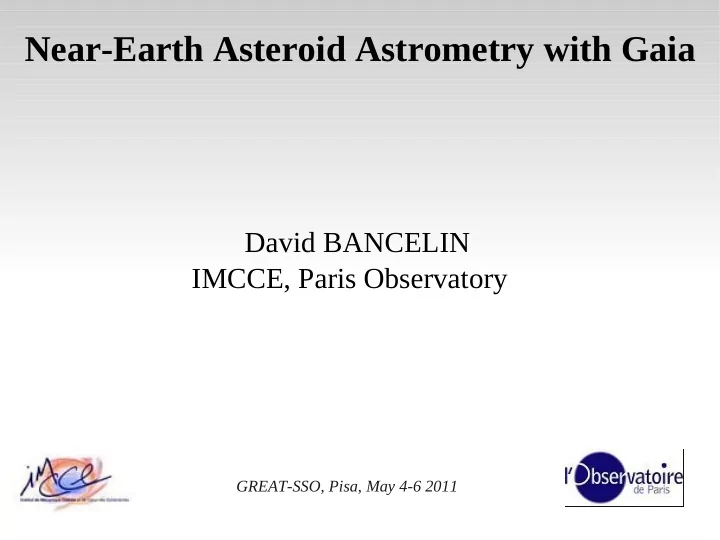

Near-Earth Asteroid Astrometry with Gaia David BANCELIN IMCCE, Paris Observatory GREAT-SSO, Pisa, May 4-6 2011
Outline Gaia Mission Scientific goals Nominal Scanning Law Astrometry for known NEAs Impact on current and long term uncertainty Collision probability Astrometry for unknown NEAs Alert Mode Combination space/ground-based data GREAT-SSO, Pisa, May 4-6 2011
GAIA Mission Scientific goals GREAT-SSO, Pisa, May 4-6 2011
GAIA Mission Scientific goals GREAT-SSO, Pisa, May 4-6 2011
GAIA Mission Nominal Scanning Law Influence on date of observations Influence on the number of observations GREAT-SSO, Pisa, May 4-6 2011
GAIA Mission Statistic of observations GREAT-SSO, Pisa, May 4-6 2011
Astrometry or known NEAs Apophis case Why Apophis? PHA (Potentially Hazardous Asteroid) discovered in 2004 MOID ≤ 0.05 A.U. and H ≤ 22.0 1213 PHAs known (~ 15% NEAs) and 148 with diameter ≥ 1 km Deep close-approach with Earth in 2029 (~ 38 000 km) Choatic orbit Impact trajectories GREAT-SSO, Pisa, May 4-6 2011
Astrometry for known PHAs Apophis case Gaia observations of Apophis Inhomogenous size of sets. Set with longuest arc used for simulations. GREAT-SSO, Pisa, May 4-6 2011
Astrometry for known PHAs Apophis case Impact on keplerian elements uncertainty G.B. Only G.B.+ Gaia Gain σ O σ O σ O / σ O + G + G Ground-Based data : Optical a (A.U.) 1.9E-08 6.8E-11 275 (1366) and Radar (5) e 6.9E-08 3.9E-09 18 Gaia data : 9 observations with i (°) 1.8E-06 1.2E-07 15 5 mas accuracy Ω (°) 9.9E-05 2.2E-06 45 ω (°) 9.9E-05 2.3E-06 43 M (°) 7.4E-05 6.5E-07 114 GREAT-SSO, Pisa, May 4-6 2011
Astrometry for known PHAs Apophis case Impact on position uncertainty GREAT-SSO, Pisa, May 4-6 2011
Astrometry for known PHAs Apophis case Impact on 2029 b-plane uncertainty 3 σ ellipse uncertainty in ( ξ , � ζ ) in 2029 Without Gaia data b-plane Primary ( ✳ ) and Secondary keyholes at ascending ( ◾ ) and descending ( ◾ ) node. b-plane Nominal Orbit Nominal orbit uncertainty + Gaia data 10.5 0.3 σ ξ (km) σ ζ (km) 87 1.4 With Gaia data GREAT-SSO, Pisa, May 4-6 2011
Astrometry for newly discovered objects Number of alerts expected Family Number Percentage (%) Amor 379 1.9 Apollo 1313 6.6 Atens 205 1 IEO 24 0.1 PHAs 583 2.9 Total 2614 12.5 Statistic on a 20000 synthetic NEAs population GREAT-SSO, Pisa, May 4-6 2011
Astrometry for newly discovered PHAs Recovery Strategy Hypothetical Geographos (PHA) detected GREAT-SSO, Pisa, May 4-6 2011
Astrometry for newly discovered PHAs ( α , δ ) prediction 12'x12' field of view centered in ML GREAT-SSO, Pisa, May 4-6 2011
Astrometry for newly discovered PHA Combination space and ground-based data x One night observation GREAT-SSO, Pisa, May 4-6 2011
Astrometry for newly discovered PHA Combination space and ground-based data GREAT-SSO, Pisa, May 4-6 2011
Conclusion Good improvement of PHAs orbits (even with faint number of observations) Useful data for Earth-impact threat study Necessity of a useful strategy for recovery Necessity of a Follow-up for G.B. observations GREAT-SSO, Pisa, May 4-6 2011
THANK YOU
Recommend
More recommend